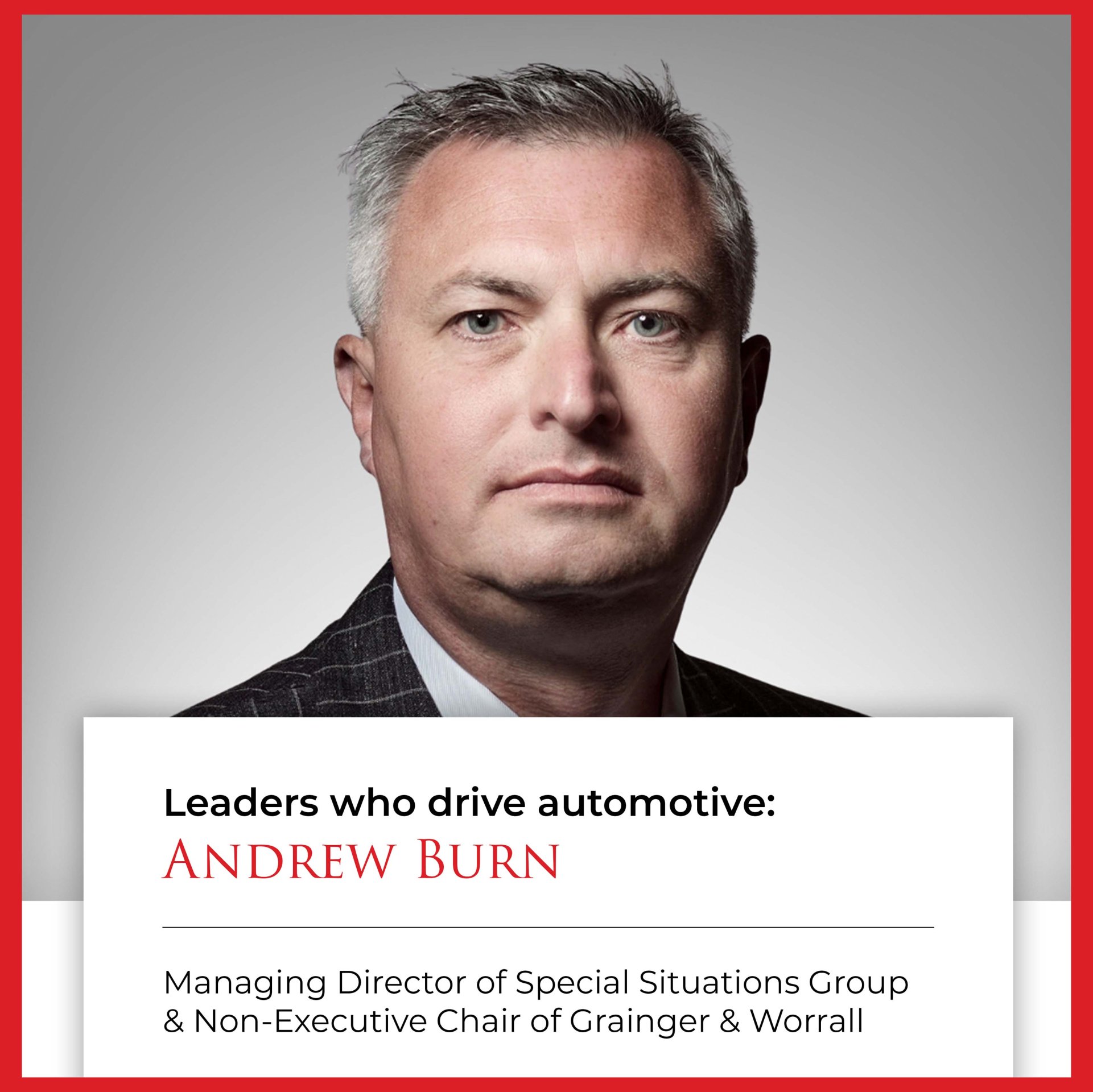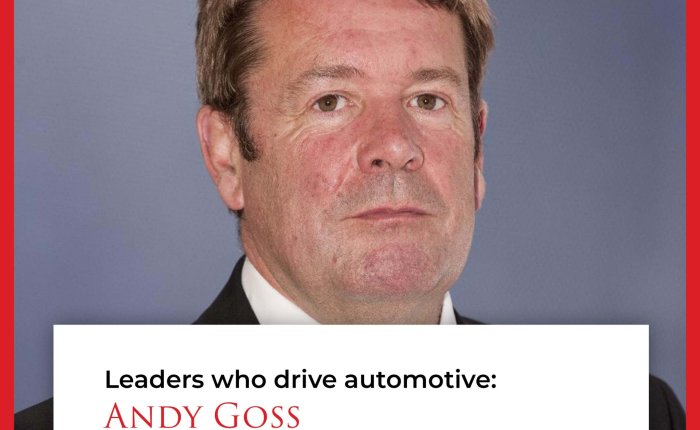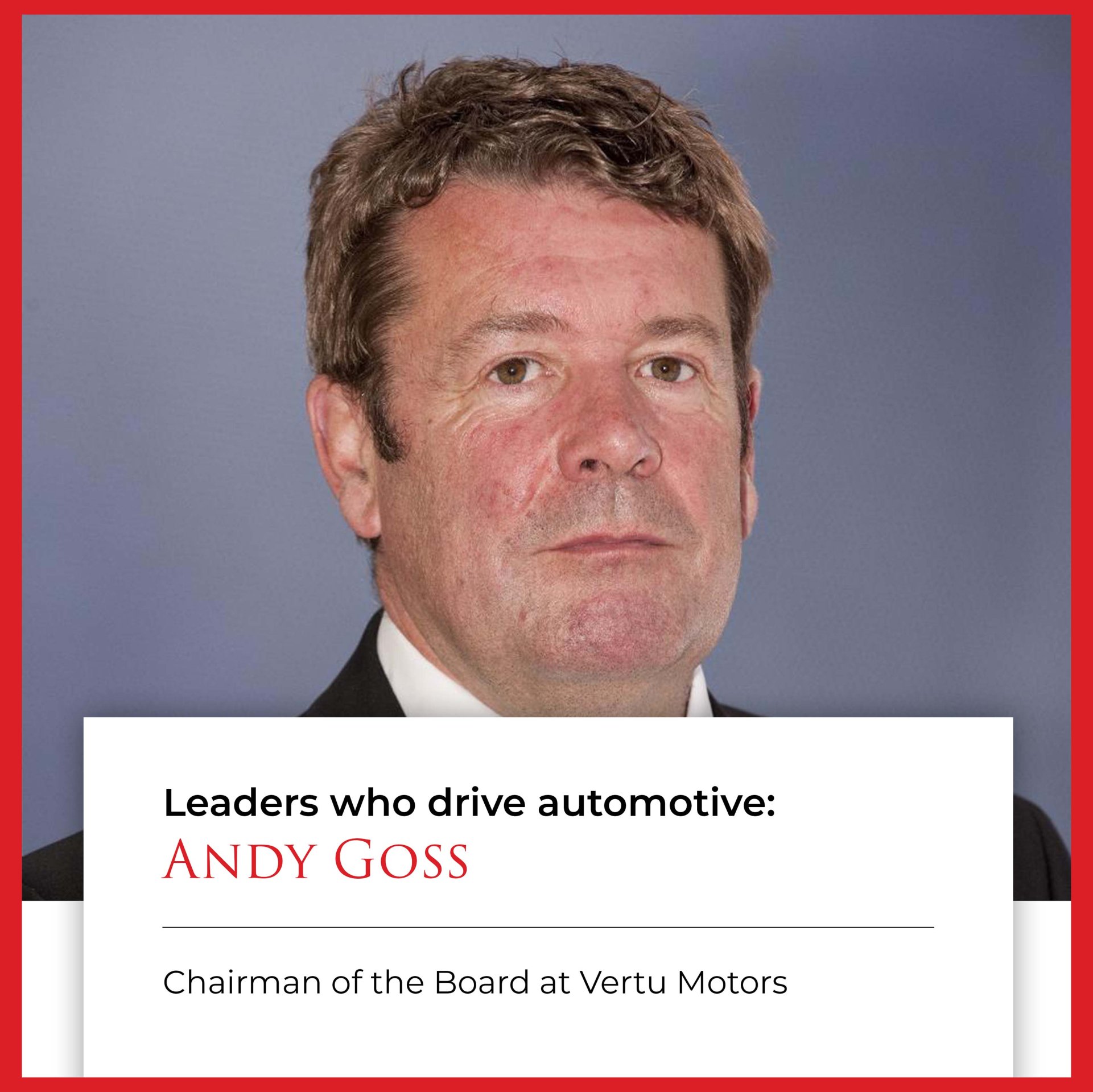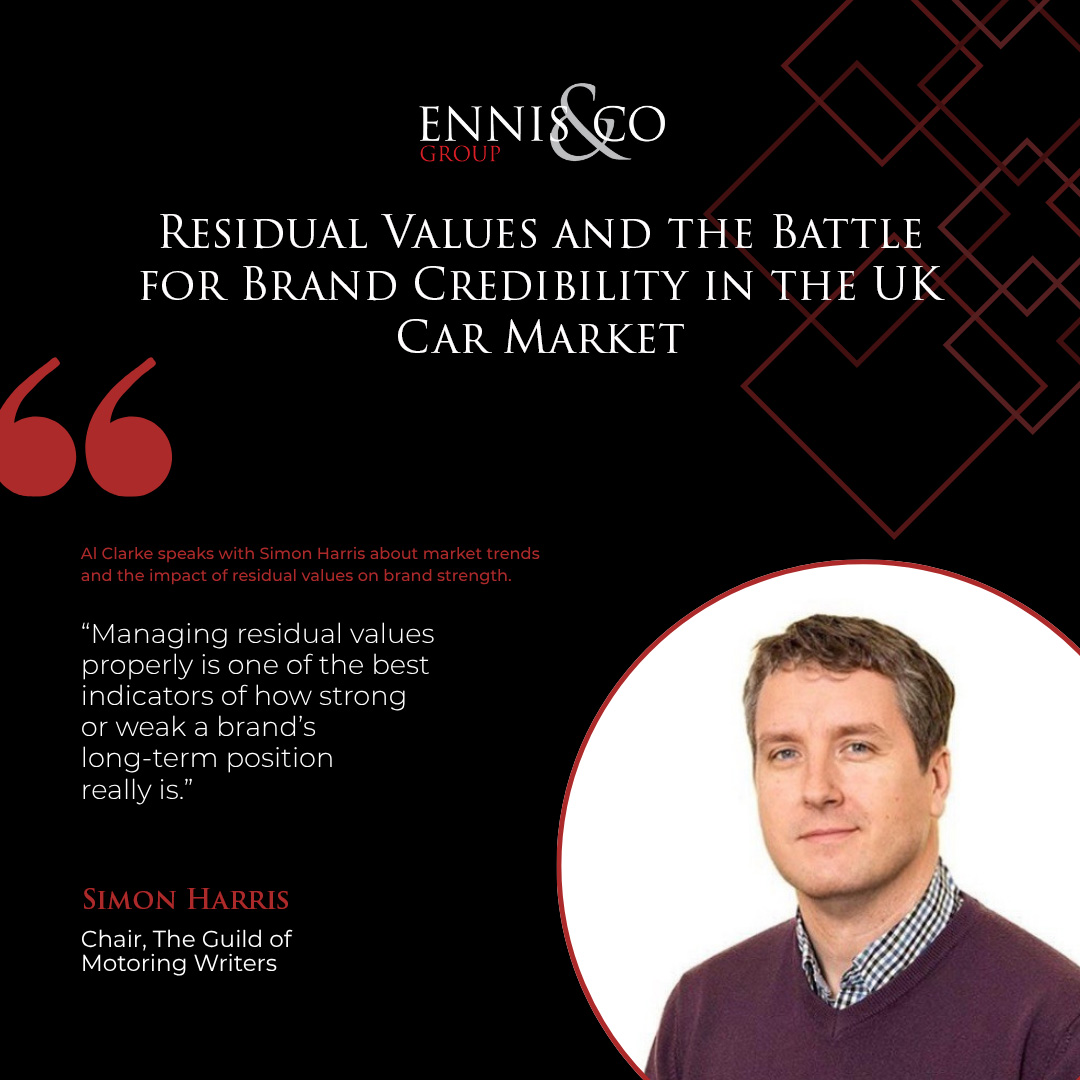As a turnaround specialist, Andrew Burn has worked with several automotive suppliers and OEMs and has gained a first-hand view of the challenges facing the sector. He talks to Lynda Ennis, Co-founder and CEO of Ennis & Co Group, about legacy leadership styles and the need for behaviours based on honesty and respect.
LYNDA ENNIS: You’ve worked extensively in business consultancy and more recently in the automotive and advanced engineering sectors. Tell me about your career journey.
ANDREW BURN: In my formative years, I always had an aspiration to be an entrepreneur and run my own business, but I was not in the financial position to do that when I was young. After studying mathematics and management studies at Brunel University, I decided to join an accountancy firm. Most of my friends were going into investment banking at the time, but I did not want to be at the mercy of economic peaks and troughs, and I saw accountancy as a safer option because it gave me a qualification to fall back on.
I applied to the big four accountancy firms and was taken on by KPMG to work in their corporate recovery unit, working with struggling companies and dealing with insolvencies – mainly restructuring, selling businesses and solving problems. I did not know anything about it when I started, but I absolutely loved the job on the basis that I could be involved in running businesses in difficulty and work with the people in them without using my own money and knowing that I could not make it any worse because they had already hit rock bottom. In my first week in the job, I found myself running a pub!
After being approached by a couple of firms about a move into corporate finance, KPMG asked me to stay and gave me a new role in its own corporate finance department. Just a few months into the job, I was had an unsolicited approach to join NM Rothschilds, which was obviously a no-brainer. I joined the bank in 2000, initially on the investment banking side, and was involved in various deals spanning private equity, privately owned businesses and a plc delisting. I learnt a lot about working long hours as well as the waste management industry being one half of the team in Manchester overseeing at that sector. I was then asked to move into the debt team in Leeds and learnt a lot about deal origination, syndication and portfolio management.
I probably did not fully appreciate the opportunity at Rothschild at the time and after four years at Rothschild had a hankering to work for a small firm, so I left and joined a small accountancy firm an unmemorable year before I was approached by KPMG about returning to the firm to help develop the company-side restructuring team in Manchester. This was not dealing with insolvencies but more about trying to prevent struggling companies from going bust, and it really felt like a coming of age for me. I suddenly realised that I had accumulated a lot of experience – quite different to other members of the team I ended up leading the “special situations” teams during the Global Financial Crisis which was a real experience. I also realised that what I was doing felt more like a vocation than work – there is no better feeling than being able to solve problems with clients in my view.
Following a secondment to London where I started to become increasingly involved in automotive engagements for clients I then went back to Manchester, but it was not long before I was on the move again. KPMG asked me to move to Birmingham to grow company-side restructuring practice there, just as I had done in Manchester. Alongside this, I also continued to develop the KPMG public sector restructuring business and lead some significant programmes in that time, but the highlight was going in as the Chief Restructuring Officer at a very large London based hospital. This felt a real accolade as there were a very small number of accredited individuals approved by KPMG at the time, given the risk management and senior approvals required to fulfil such roles.
In 2021, the KPMG restructuring business in the UK was sold to private equity and I stayed involved for a year and then left.
My initial plan was to just retire and look after my small holding and work with a number of farming businesses whose owners work tirelessly but never seem to get a commercial break. Much to my surprise I also got a few unsolicited calls from businesses looking for help and after a few months I decided to set up my own consultancy, Special Situations Group Limited, to provide companies with operational, tactical and strategic advice. I am, by nature, someone who needs to feel that I am contributing and adding value by supporting businesses and the people within them. I get enormous satisfaction from that.
Since starting the company in 2022, my team and I have worked with numerous clients across different industries to help them fix problems, restructure or, conversely, to support companies in their growth aspirations or to prepare them for sale.
Among our clients across a number of sectors are several businesses in the automotive supply chain, including Autins Group PLC, the Grainger and Worrall Group, and KW Special Projects. I continue to serve as Non-Executive Chairman of Grainger and Worrall and have recently stepped back from KW Special Projects, the latter being one of the turnarounds I am most proud of as the workforce came together so well, we eradicated all of the politics in the business and we became an extended family that delivered outstanding results.
LE: Being fairly new to the automotive industry and having experience across a range of sectors. Does automotive differ in terms of leadership? Do you feel you’ve had to adapt your leadership style or approach to different projects?
AB: That is a very interesting question. The automotive sector has developed over very different generations. In the 1960s and ‘70s, there were lots of issues with the unions, and there was a strong culture of getting hundreds of people together in a mass meeting. That has driven a certain behaviour, and it’s multi-generational. The world has changed significantly and whilst a lot of the sector has changed you still see these behaviours in pockets or manifest themes in some high-pressure restructuring situations.
The automotive sector is changing at pace, and I would say that there needs to be a mix of sector knowledge and fresh thinking, either developed internally or brought in from other sectors. There is so much change taking place, for example the rapidly expanding impact of the Chinese OEMs. As a child it was all about 0-60mph times and now most EV’s can beat most combustion engine technology and so the focus is on other things. There is undoubtedly a growing emphasis on entertainment and experience rather than it just being about the car.
It is almost as if we have got to work through the old or out-of-date behaviours and get into a new way of thinking that is not about masses of people and production lines. My view is that we will ultimately see more modular development such as common platforms, skateboard technology etc. There also needs to be more collaborative working in the supply chain because you cannot just beat the crap out of suppliers anymore.
Is this fundamentally different from other sectors? Yes and no. The technology sector is obviously very different for example their approach to thinking about AI and engaging with their workforces and the office environment. In other sectors I have seen great results from collaboration with suppliers and the development of joint business plans where the customer and supplier set out what they want from their long-term relationship and are open about their aspirations.
What I cannot stand in the sector are the politics. Yes, they exist across many businesses in many sectors, but they companies that eradicate as much of it as possible in my experience are the ones that survive. Being positive about the sector, the OEMs and suppliers that have dealt with this and have driven the right behaviours internally in my experience are the easiest organisations to deal with and typically the most successful. Speaking personally, I was born in Yorkshire and would rather have a reputation for being blunt, direct, but empathetic rather than being a player in corporate landscapes. I would rather be criticised for being honest and transparency when I’m leading teams or solving problems than play politics. I believe it is a philosophy that has enabled me to get the respect of the clients I work with and the teams that I lead now and in the past.
LE: As well as being honest and direct, what other aspects of your leadership style do you think are important when you’re trying to effect change in a business?
AB: On a day-to-day basis, I always want to keep a very close eye on the business fundamentals, whether it is KPIs or other reference points, so that I know when to intervene or speak to the teams to nudge them in the right direction.
In preparation for meetings, I spend a lot of time thinking about the different dynamics that will be facing me in the room rather than going through lots of papers. I do this not to play politics but to think about what people will need from the meeting to go away afterwards feeling reassured and empowered, knowing that they’ve been heard. My aim is to try to come up with a collaborative way forward, and so, ahead of the meeting, I will spend a lot of time lobbying and listening to what people have got to say to try to find a way forward. The listening part is fundamental – understanding what is important to people and working with them to achieve the objective.
It is not always possible and yes, there are times when you have to take a robust position which other parties may not like, but my view is where possible collaborate. It ends up paying off multiple times over in my experience.
LE: In your experience, is the automotive industry on a journey in terms of leadership? Do you see younger leaders stepping up, or do you feel it is still dominated by an old-school culture? Are we doing enough to train and develop tomorrow’s leaders?
AB: I think there is a spectrum. As I have said, I think there are some historic behaviours that are still present in the sector, and the further we get away from those behaviours, the better it will be for the industry. My worry is that the speed of change in the sector will just continue to accelerate and perhaps there is a benefit for having a greater mix of in sector and out of sector experience across OEMs and suppliers to derisk them. From my perspective I am not sure that the changes are happening fast enough, but perhaps the ability to change is being hampered by the stresses in the sector.
In terms of succession planning and developing new leaders, I think the issue is complicated by the fact that there are a lot of people sitting in boardrooms who are worried about their jobs and do not want new blood coming in who could be a threat to them. You also often see issues around shareholders having differing views as to who they want as a successor, sometimes in conflict with their board.
Whilst it is always a spectrum from great to bad, my experience is that there are many organisations that do not spend enough time thinking about the constitution of the board and having the right mix of skill sets. You must keep an eye on that to make sure the dynamic and chemistry are right. Are people actually being honest with each other? If you cannot eradicate the politics across the leadership team, you have not got a chance of eradicating the politics further down the organisation.
LE: Some chief executives fail because they have come up through their specialism but lack the breadth of knowledge, and indeed the training, to handle the pressures of the top job. What do you think are the attributes and traits that you need from a chief executive today?
AB: I will answer this by telling you about a former Royal Marine, who I met a few weeks ago. He became the youngest colonel in the British Army since World War II. He resigned his commission in principle after one of his marines was convicted of something. He had absolutely nothing to do with the incident, but as the commanding officer, he felt he had to take responsibility by giving up his career. I have immense respect for what he did, and I think he embodies what leaders should be. Too many, when confronted by a crisis, adopt the attitude of ‘It has got nothing to do with me’ or ‘I did not know about it.’ When things go wrong, weak leaders look for excuses or blame factors beyond their control.
Looking at other sectors, you may recall the chief executive of the Co-op, who publicly apologised for the cyber-attack that resulted in the theft of personal data of millions of Co-op members. She held up her hand and said the Co-op had got things wrong and that she was really sorry. Judging by the commentary in the press and on social media, she has earned huge respect for fronting up, saying sorry and promising to do better in the future. For what it is worth, she very much has my respect.
LE: When you go into organisations to carry out a restructure, how do you manage the existing leadership?
AB: It comes back to trying to understand where they are. Sometimes you can do that quickly, and sometimes it will take time. A key thing for me is to be seen to be working in the interests of the company and all the stakeholders to achieve the objective. Throughout my entire career, I have never gone into situations thinking, ‘How can I land and expand? How can I maximise my fee?’ It is just about doing the right thing in my mind.
To take the example of one company I have worked with, my first few conversations with the chief executive were to provide reassurance that I was there to provide support and that I was not after their job. My job is to come in and help fix things, provide as much support as I can and leave the organisation in a stronger place.
As I said before, I see a key aspect of my role as listening, and an important aspect of what I do is talking to the shareholders about their frustrations about what’s been going on, or not going on, and the kind of changes they want to see.
LE: Do you have a particular methodology when working on a turnaround?
AB: The key to my approach is consistency. First, I will do my research, which generally means talking to every member of the board and every member of the executive team and immersing myself in data to carry out my analysis. Then I will sit down with them and give them my take on the situation so that we can then work out a plan.
Turnarounds are not just about cost-cutting. It is easy to get rid of all the costs by closing the whole thing down, but that does not work. You have got to keep cost reduction in mind, but you also have to think about what is needed for the medium- to long-term success of the business. As well as saving the business, reducing the cost base and restructuring it, you must make sure the business is able to rebuild its resilience as quickly as possible, because at some point the market could change.
LE: As someone who is at the sharp end of business every day, what do you think should be the priority for the automotive leaders of the future?
AB: I remember talking to Stuart Rowley when he took over at Ford of Europe, and he told me that his priority was changing the cultural tone of the organisation. He was absolutely right. A leader needs to think about the cultural tone that they want and then change the behaviour of the executive team – or change the people if necessary – to align with that vision. That is exactly what I am doing when I go into businesses to help drive change. I am working with the Board or shareholders to change the tone of the organisation by changing attitudes of the leaders. I am thinking about helping to create the right culture and behaviours, and to remove all the politics to replace it with transparency and collaboration so that everybody works as a team and will die in a ditch for their colleagues. They need to have confidence in themselves without being arrogant. They need to understand their own capabilities and limitations. They need to show respect to the staff and be able to unite everyone around what is needed for the business.
LE: Who are the people who have inspired you most in terms of leadership?
AB: I remember being really inspired by a teacher at school, “Dusty” Rhodes, who, for some reason, I had a real connection with. He was blunt and direct but also very respectful, and he was a brilliant mentor to pupils.
My first boss at KPMG was also a big influence. I remember him sitting me down when I first arrived and telling me that he knew I was a recent graduate who had never done the job before, but as long as I demonstrated that I thought through any decision I made, he would back me to the hilt, regardless of whether he agreed with me or not. But if I did not think things through thoroughly, I would be on my own. I’ve had the same conversation with every person I have managed ever since.
Thinking about the automotive sector, I would also single out Duncan Eldridge, who I hired as Chief Executive of Grainger and Worrall. He has done a fantastic job in restructuring the business, resetting the operation and rebuilding the relationships with the customers, and the turnaround he has driven since I stepped back from being involved day to day has been remarkable. That is not something I could have done, and back to the honesty and transparency point, made clear to the c700 staff when he took over – that they deserved a better CEO than I could ever be.






